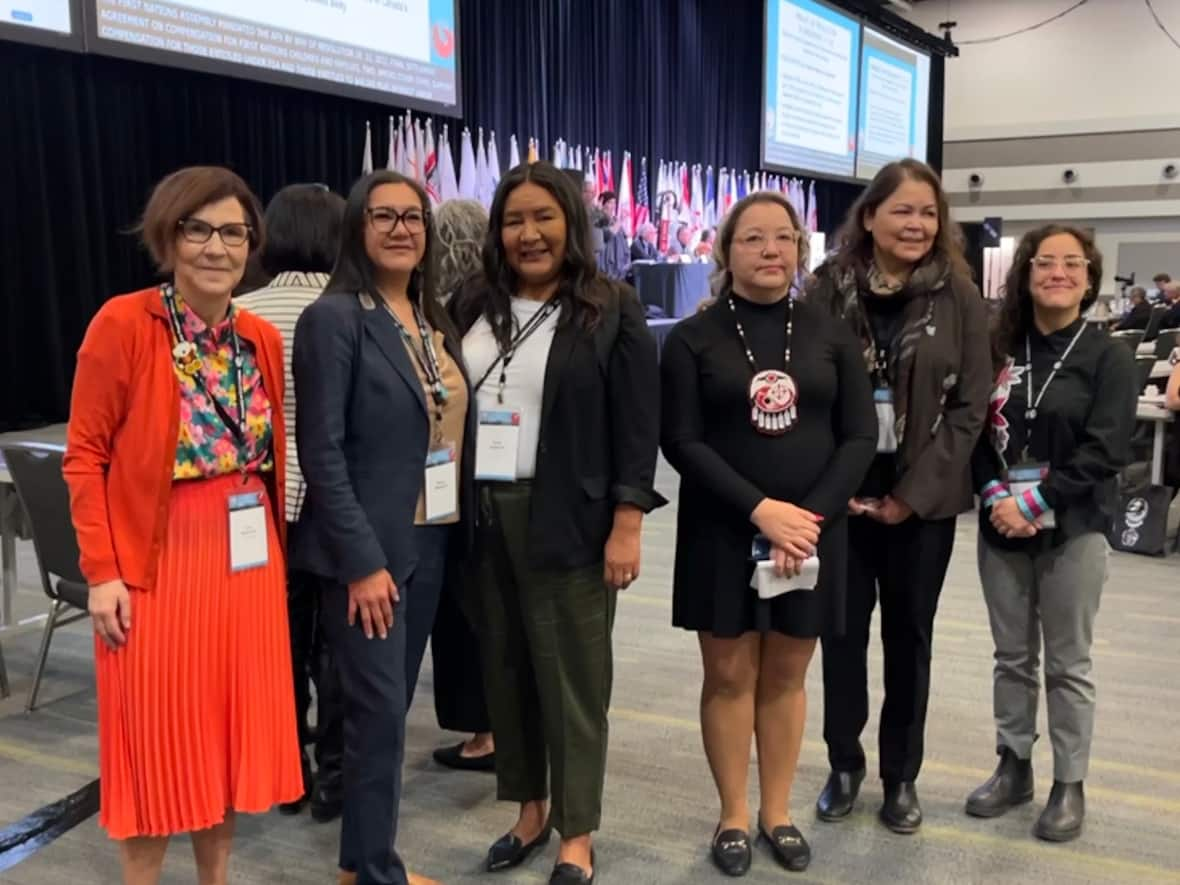Assembly of First Nations chiefs endorse $23B revised child-welfare compensation deal

Assembly of First Nations (AFN) delegates have endorsed a $23.4-billion revised agreement to compensate victims of the underfunded First Nations child-welfare system, bringing a 16-year legal battle one step closer to an end.
An emergency resolution carried unanimously Tuesday morning in Ottawa says the AFN chiefs-in-assembly will "fully support" the latest version of the deal and back the national organization as it seeks approval at the Canadian Human Rights Tribunal (CHRT) and the Federal Court.
The deal would resolve a long-standing human rights complaint and a class-action lawsuit, and the resolution adds a call for the prime minister to make a formal and meaningful apology to survivors of the child-welfare system and those who have died.
Ashley Bach, a lead plaintiff in the class-action lawsuit, was moved to tears as she reflected on that harm and loss.
"My heart is really hurting so much for all the children, youth, parents and grandparents who aren't here anymore," she said in a speech to the delegates.
"It's really not fair that it took 16 years."
The AFN and the First Nations Child and Family Caring Society of Canada announced the agreement on Monday hours before the special chiefs assembly opened at the Shaw convention centre.
Cindy Blackstock, executive director of the caring society, called the revised agreement "the right deal at the right time." She launched the original human rights complaint along with the AFN in 2007, but said the fight doesn't end with compensation.
"I'm very serious about making sure this is the last time our kids are hurt by Canada, and that work is still continuing," she told CBC News following a presentation to the chiefs.
"When that's done, it'll be a big exhale on my part."
A 2016 CHRT decision found that the Canadian government racially discriminated against First Nations youth by chronically underfunding on-reserve child and family services and refusing to pay for essential health care via Jordan's Principle.
WATCH | New child-welfare compensation deal expands coverage:
In 2019, the tribunal ordered Canada to pay $40,000, the maximum amount allowable, to individual victims and their families. Xavier Moushoom, who is Anishinaabe from Quebec and a survivor of the child-welfare system, started the class action, which the AFN soon joined.
Canada and the AFN struck an umbrella final settlement agreement last year, pledging to resolve both legal battles at once, but the tribunal rejected the deal because it left out some and shortchanged others covered under its 2019 order.
In its December 2022 decision, the tribunal said the AFN's inability to produce a supportive chiefs' resolution left an "important question" unanswered about local support.
UNDRIP plan called 'disappointing'
The AFN advocates for chiefs from 634 First Nations, who meet twice annually to delegate the national lobby group a mandate. There were 133 delegates registered for the April 3-6 assembly as of 4:30 p.m. Monday.
The chiefs must also address about 30 more outstanding resolutions and strategize a response to Canada's plan to implement the United Nations Declaration on the Rights of Indigenous Peoples, or UNDRIP.
The chiefs debated resolutions Tuesday afternoon before tackling the UNDRIP action plan, which federal Liberal Justice Minister David Lametti released in draft in the lead-up to the gathering.
Under the 2021 United Nations Declaration on the Rights of Indigenous Peoples Act (Bill C-15 or UNDA), federal legislation that aims to harmonize Canadian laws with the international declaration, the plan must be finished by June.
Consisting of a wide-ranging checklist of Trudeau Liberal government policy initiatives, the draft plan has garnered mostly criticism.
In a technical briefing, Sara Mainville, an Anishinaabe lawyer with JFK Law advising the AFN, described the plan as heavy on verbiage but light on commitments. She said it falls short on several fronts, tends toward "non-committal" and "vague" buzzwords, and ultimately wouldn't achieve the declaration's aims.
"The draft action plan in many respects is quite disappointing," she said.
"And the commitments are few and far between."
Terry Teegee, regional chief for British Columbia where the province passed nearly identical legislation in 2019, likewise slammed the plan.
"It has been disappointing to read this first draft," he said. adding, however, that First Nations shouldn't be surprised given what he called a similarly disappointing rollout in B.C.
Lametti will have his chance to sell the chiefs on the plan Wednesday morning when he's scheduled to address the assembly.


